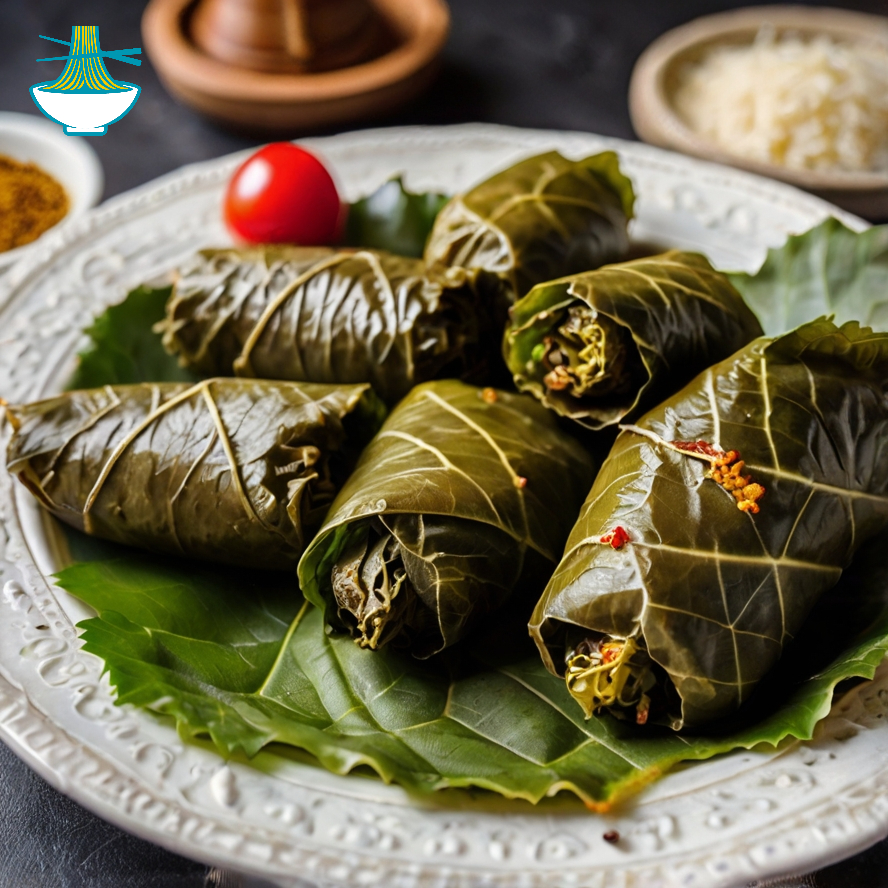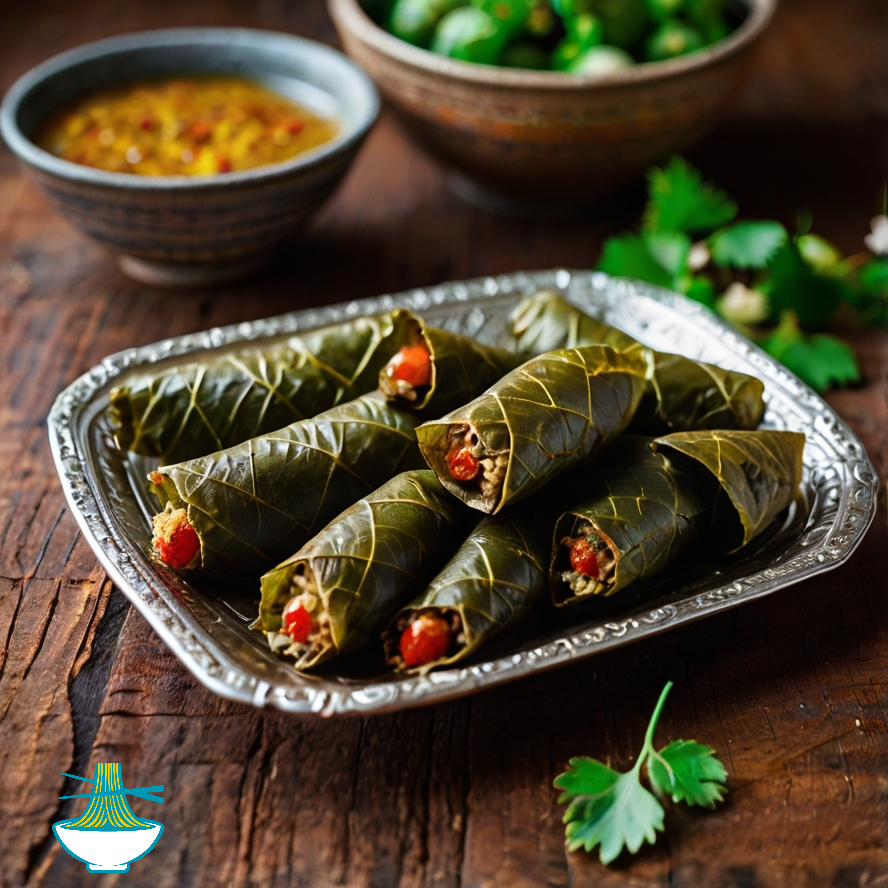Discover the authentic taste of Warak Enab, a traditional Middle Eastern dish featuring grape leaves stuffed with a savory mixture of rice, ground meat, and aromatic spices. Perfect as an appetizer or a main course, this recipe brings the rich flavors and cultural essence of this classic dish to your table. Follow our step-by-step guide to make Warak Enab that’s sure to impress family and friends.
Ingredients:
- Grape leaves: 1 jar (about 50-60 leaves), rinsed and drained
- Ground beef or lamb: 500 grams
- Rice: 1 cup, rinsed
- Onion: 1 medium, finely chopped
- Tomato paste: 2 tablespoons
- Olive oil: 2 tablespoons
- Fresh parsley: 1/2 cup, finely chopped
- Fresh mint: 1/4 cup, finely chopped
- Lemon juice: 1/4 cup
- Salt: 1 teaspoon
- Black pepper: 1/2 teaspoon
- Ground cinnamon: 1/2 teaspoon
- Allspice: 1/2 teaspoon
- Water or broth: 2 cups
Instructions:
Prepare the Filling:
- In a large bowl, combine ground meat, rice, chopped onion, tomato paste, parsley, mint, salt, pepper, cinnamon, and allspice. Mix well until all ingredients are evenly distributed.
Prepare the Grape Leaves
- Blanch the grape leaves in boiling water for about 2 minutes to soften. Drain and pat dry.
Stuff the Grape Leaves:
- Place a spoonful of the meat mixture in the center of each grape leaf. Fold the sides over the filling and roll tightly to form a small cylinder. Repeat with remaining leaves and filling.
Cook the Warak Enab:
- Arrange the stuffed grape leaves in a large pot, placing them seam side down. Drizzle with olive oil and lemon juice. Add water or broth to cover the rolls. Place a plate on top of the rolls to keep them submerged during cooking.
- Cover and simmer over low heat for 45-60 minutes, or until the rice and meat are fully cooked and the grape leaves are tender.
Serve:
- Let the Warak Enab cool slightly before serving. Enjoy warm or at room temperature, often accompanied by yogurt or a fresh salad.
This traditional Warak Enab recipe is a delightful addition to any meal, offering a taste of Middle Eastern cuisine that’s both flavorful and satisfying.
Nutritional Values:
Grape Leaves:
- Calories: 14
- Protein: 1 gram
- Fat: 0.3 grams
- Carbohydrates: 3 grams
- Fiber: 2 grams
- Vitamins: High in Vitamin A and Vitamin K
Benefits: Grape leaves are rich in antioxidants and vitamins. They support heart health, improve blood clotting due to high Vitamin K, and help with digestion due to their fiber content.
Ground Beef or Lamb:
- Calories: 250
- Protein: 26 grams
- Fat: 17 grams
- Carbohydrates: 0 grams
Benefits: Ground beef or lamb is an excellent source of high-quality protein, which is essential for muscle growth and repair. It also provides important nutrients like iron, zinc, and B vitamins, which support overall energy levels and immune function.
Rice:
- Calories: 130
- Protein: 2.7 grams
- Fat: 0.3 grams
- Carbohydrates: 28 grams
- Fiber: 0.4 grams
Benefits: Rice is a good source of energy due to its carbohydrate content. It provides essential nutrients like thiamine and niacin, which are important for energy metabolism and overall health. Brown rice offers more fiber and nutrients compared to white rice.
Onion:
- Calories: 40
- Protein: 1 gram
- Fat: 0.1 grams
- Carbohydrates: 9 grams
- Fiber: 1.7 grams
Benefits: Onions are rich in antioxidants and sulfur compounds, which can help reduce inflammation and support heart health. They also contain prebiotics that promote digestive health.
Tomato Paste:
- Calories: 82
- Protein: 4 grams
- Fat: 0.6 grams
- Carbohydrates: 19 grams
- Fiber: 2.5 grams
Benefits: Tomato paste is high in lycopene, a powerful antioxidant that may help protect against certain cancers and support heart health. It also provides vitamins like Vitamin C and Vitamin A.
Olive Oil:
- Calories: 884
- Protein: 0 grams
- Fat: 100 grams
- Carbohydrates: 0 grams
Benefits: Olive oil is rich in monounsaturated fats and antioxidants, which can improve heart health, reduce inflammation, and provide a source of healthy fats.
Fresh Parsley:
- Calories: 36
- Protein: 3 grams
- Fat: 0.8 grams
- Carbohydrates: 6 grams
- Fiber: 3.3 grams
Benefits: Parsley is packed with vitamins A, C, and K, which support immune function, skin health, and bone health. It also contains antioxidants that help combat oxidative stress.
Fresh Mint:
- Calories: 70
- Protein: 3 grams
- Fat: 0.9 grams
- Carbohydrates: 14 grams
- Fiber: 8 grams
Benefits: Mint aids digestion and can help soothe gastrointestinal issues. It also provides a fresh flavor and contains antioxidants that support overall health.
Lemon Juice:
- Calories: 29
- Protein: 1 gram
- Fat: 0.3 grams
- Carbohydrates: 9 grams
- Fiber: 2.8 grams
Benefits: Lemon juice is high in Vitamin C, which boosts the immune system and helps with the absorption of iron. It also supports digestion and acts as an antioxidant.
Salt:
- Sodium: 38,000 mg
Benefits: Salt is essential for maintaining fluid balance, nerve function, and muscle contraction. However, excessive intake should be avoided due to potential health risks.
Black Pepper:
- Calories: 255
- Protein: 10 grams
- Fat: 3.3 grams
- Carbohydrates: 64 grams
Benefits: Black pepper contains piperine, which enhances nutrient absorption and has antioxidant properties. It also aids digestion and may help improve metabolism.
Ground Cinnamon:
- Calories: 247
- Protein: 4 grams
- Fat: 1 gram
- Carbohydrates: 81 grams
- Fiber: 53 grams
Benefits: Cinnamon has anti-inflammatory and antioxidant properties. It may help regulate blood sugar levels and support heart health.
Allspice:
- Calories: 251
- Protein: 6 grams
- Fat: 6 grams
- Carbohydrates: 65 grams
- Fiber: 27 grams
Benefits: Allspice has antioxidant properties and may help with digestion and reduce inflammation. It also provides a unique flavor to dishes.
Water or Broth:
- Nutritional Values: Varies depending on the type of broth (e.g., chicken, vegetable).
Benefits: Water and broth help in cooking and infusing flavor. Broth can provide additional nutrients and flavors depending on its ingredients.
This detailed breakdown helps in understanding the nutritional value and health benefits of each ingredient used in Warak Enab.


Comments